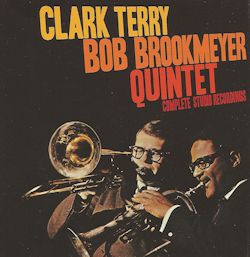CD1
1. Tête à Tête
2. Pretty Girl
3. Blue China
4. Hum
5. Blindman, Blindman
6. Step Right Up
7. Weep
8. Straight, No Chaser
9. Sometime Ago
10. Hymn
11. Dancing on the Grave
12. Battle Hymn of the Republic
13. The King
14. Ode to a Flugelhorn
15. Gal in Calico
CD2
1. Green Stamps
2. Hawg Jawz
3. Simple Waltz
4. Just an Old Manuscript
5. Haig & Haig
6. I Want a Little Girl
7. Mood Indigo
8. Milo’s Other Samba
9. Gingerbread Boy
10. My Gal
11. Naptown
12. Morning Mist
13. Bye Bye Blackbird
Clark Terry – Trumpet, flugelhorn, vocals
Bob Brookmeyer – Valve trombone
Roger Kellaway – Piano (tracks I/1-15, II/1-4)
Bill Crow – Bass (tracks I/1-15, II/1-4)
Dave Bailey – Drums
Hank Jones – Piano (tracks II/5-13)
Bob Cranshaw – Bass (tracks II/5-13)
It is good to have all the studio recordings of this group on one CD. The Clark Terry/Bob Brookmeyer Quintet was one of the most exciting and inventive
combos of the 1960s. The quintet was actually formed in 1961 but their first studio recording didn’t take place until 1964. With his inimitable humour,
Clark Terry says “Sorry to have kept you waiting”.
Clark mainly plays the flugelhorn on these recordings. The instrument blends superbly well with Bob Brookmeyer’s valve trombone, and they often
create magical counterpoint with one another. One suspects the presence of experienced arranger Brookmeyer behind some of the well-meshed pairings. Terry’s
flugelhorn sound is instantly recognisable, and his solos reach perfection, while often reaching for the skies without sounding shrill. Brookmeyer’s tone
is more gruff, like a friendly uncle to Clark’s mischievous schoolboy. Together they harmonise sweetly, and they certainly know the value of breaks and
stop choruses to stoke up the heat.
One element of the quintet demands special attention: the playing of pianist Roger Kellaway. He is almost unrecognised these days, but he creates wondrous
solos which each seem unique. Occasionally he throws in a few discords to sharpen things up. In Tête à Tête his solo suddenly switches from 4/4
swing to stride piano. In Green Stamps he plays a whole chorus as a continuous rolling tremolo. His musical wit matches that of the band’s
co-leaders. He also comps sparingly but constructively behind the front line.
Another element in the band’s success is the remainder of the rhythm section: bassist Bill Crow and drummer Dave Bailey, who both keep the music swinging
propulsively. Bailey has a particular knack of lighting a spark behind the band, detonating the group to more heights of exhilaration. The final nine
tracks on the CD use pianist Hank Jones and bassist Bob Cranshaw, who fulfil the same roles with slightly less animation.
Twelve of the tracks herein were composed by members of the band, primarily Terry or Brookmeyer, and the rest are jazz standards or items from the Great
American Songbook. But the repertoire is remarkably varied, and several of Clark or Bob’s compositions deserved to become standards. Terry’s Simple Waltz alternates between fast waltz time and 4/4 but manages to swing in each tempo.
The standard Sometime Ago is a fine example of restrained playing from Clark, Bob and Roger. Charlie Parker’s Hymn gives Kellaway the
chance for some mixed emotions at the piano, while Terry and Brookmeyer really go to town. The only track I have second thoughts about is I Want a Little Girl (an unwise title nowadays), which is fairly ridiculous, with Terry’s vocal abetted by wry comments from Brookmeyer in the
margins. Clark manages to retrieve his dignity with his storming solo.
When I started reviewing this album, I forgot that I had reviewed
a similar collection of their live performances. But my opinion of the band is unchanged. Clark Terry summed up the group’s ethos thus: “It seemed to me there’s too much put-down music, put-on music,
hurray-for-me music and the-hell-with-everybody music. So we thought we’d have some compatible music”. This quintet was one of the most compatible groups
ever, and their music is a continual delight.
Tony Augarde
www.augardebooks.co.uk
